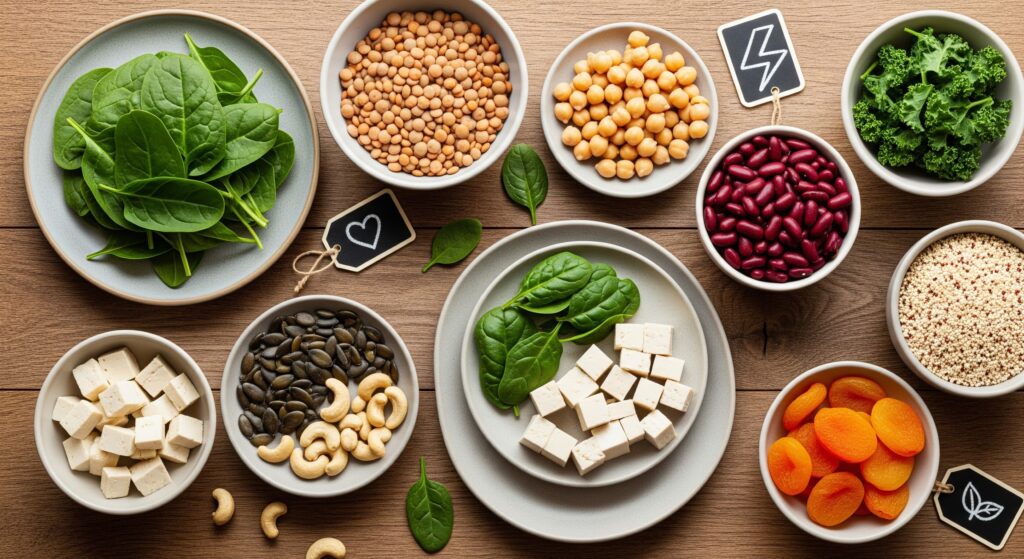Iron is not just another mineral you read about on nutrition charts; it is the silent powerhouse that keeps your body moving. From transporting oxygen through your bloodstream to fuelling enzymes that keep vital processes ticking, iron underpins stamina, energy, and immunity. Yet, despite its importance, iron deficiency is quietly widespread, affecting millions across the globe with 1 in 4 people suffering from anaemia.
For women, children, and those following a vegetarian lifestyle, ensuring adequate iron intake can be a tricky balancing act. Fortunately, with mindful choices and a little awareness, a plant-based diet can deliver plenty of this essential mineral. But first, let us look at how iron functions in the body and why some food combinations work far better than others.
Heme vs Non-Heme Iron: Why It Matters
Not all iron is absorbed equally. Understanding the distinction can help prevent deficiencies and make your meals work harder for you.
- Heme Iron: Found in meat, fish, and eggs. Heme iron is absorbed efficiently, roughly 15 to 35 percent. This makes it easier for omnivores to meet their needs.
- Non-Heme Iron: Found in leafy greens, legumes, seeds, and fortified grains. This form is absorbed more slowly, 2 to 20 percent. Its uptake can be enhanced by pairing with Vitamin C or avoiding inhibitors like tea, coffee, or excess dairy during meals.
Vegetarians and vegans can still hit their iron targets with smart combinations and preparation techniques.
Subtle Signs You Might Be Low on Iron
Iron deficiency often develops quietly and may show up in ways that are easy to dismiss.
- Persistent fatigue that sleep does not cure
- Pale skin, brittle nails, or unexplained hair loss
- Dizziness, poor focus, or frequent headaches
- Shortness of breath even during light activity
If these persist, a simple blood test and consultation with a doctor can prevent long-term complications.
Iron-Rich Foods for Vegetarians

Vegetarian diets do not have to mean low iron. Nature provides ample choices if you know where to look.
- Leafy Greens
Leafy vegetables are nutritional heavyweights. They provide iron along with folate, Vitamin A, and antioxidants.
- Spinach: Versatile and nutrient-packed, ideal for curries, soups, or salads
- Amaranth Leaves (Chaulai): An Indian favourite, rich in iron and calcium
- Moringa Leaves: Also called drumstick leaves, they combine iron and Vitamin C naturally
- Fenugreek Leaves (Methi): Small in quantity, big on benefits. Adds iron quietly to meals
- Legumes and Pulses
Pulses are central to Indian cooking. They are packed with iron and plant protein.
- Lentils (Masoor, Moong): Fast to cook, hearty, and iron-rich
- Chickpeas (Chana): Perfect for curries, salads, or hummus
- Kidney Beans (Rajma): Pair with rice for a wholesome, iron-packed meal
- Soy Products (Tofu, Soya Chunks): Offer iron plus protein, very useful for vegetarians
- Nuts and Seeds
Tiny but potent, nuts and seeds provide a concentrated source of iron.
- Pumpkin Seeds: Portable and rich in iron, magnesium, and zinc
- Sesame Seeds (Til): Traditionally used in laddoos and chutneys. They are surprisingly iron-rich
- Flaxseeds: Not just for healthy fats. They add meaningful iron content
- Almonds & Walnuts: Moderate in iron but still valuable when eaten regularly
- Whole Grains and Fortified Foods
Whole grains, especially minimally processed, retain essential minerals including iron.
- Quinoa: A rare grain with complete protein and iron
- Ragi (Finger Millet): Known for calcium and iron. Ideal for children and women
- Oats & Fortified Cereals: Quick breakfast options that contribute extra iron
- Brown Rice: Works well with legumes to create a nutrient-dense meal
- Dried Fruits and Natural Sweeteners
These sweet morsels can provide iron while tasting delightful.
- Raisins: Easy snack or addition to meals, naturally iron-rich
- Figs: A traditional choice for blood health
- Dates: Provide iron plus quick energy, perfect for combating fatigue
- Jaggery (Gur): Indian households have long relied on it to fight weakness
Tips to Improve Iron Absorption
- Pair iron-rich foods with Vitamin C sources like lemon, oranges, tomatoes, or strawberries
- Avoid tea, coffee, and excessive dairy with iron-heavy meals
- Soaking, sprouting, and fermenting grains or pulses can reduce absorption inhibitors
- Cooking in cast-iron vessels can add a subtle iron boost
Who Needs Extra Iron?
Some people need more iron to help keep them healthy and well. Women in particular require more iron because of menstrual blood loss and the extra demands of pregnancy. Both children and adolescents have higher demands because iron is necessary for their rapid growth and developing brain.
It is especially important for those with an active lifestyle, particularly athletes, as they require more iron to produce and store red blood cells and to maintain energy levels. Likewise, individuals recovering from illness need extra iron to assist with tissue repair and the reconstitution of blood.
Conclusion
A vegetarian diet, if balanced, can fully meet iron requirements. Leafy greens, pulses, nuts, whole grains, dried fruits, and Vitamin C-rich pairings make deficiencies unlikely. Consistent inclusion matters far more than occasional intake.
Persistent symptoms should prompt medical consultation. With mindful planning, plant-based diets can support energy, vitality, and long-term blood health.
FAQs
- Can low iron affect hair and skin?
Yes, it may cause hair fall, brittle nails, and dull skin due to reduced oxygen supply to tissues - How long to improve iron through diet?
Typically 1 to 3 months with consistent intake - Should I take Vitamin C with every iron meal?
Not mandatory for every meal, but it enhances absorption for main iron sources - Can milk reduce iron absorption?
Yes, especially when consumed with iron-rich meals because calcium interferes - How can vegetarians ensure adequate iron?
Include a mix of pulses, leafy greens, nuts, fortified cereals, and dried fruits regularly - Can plant-based iron be harmful?
Rarely, since absorption self-regulates, unlike high-dose supplements
Read More:

